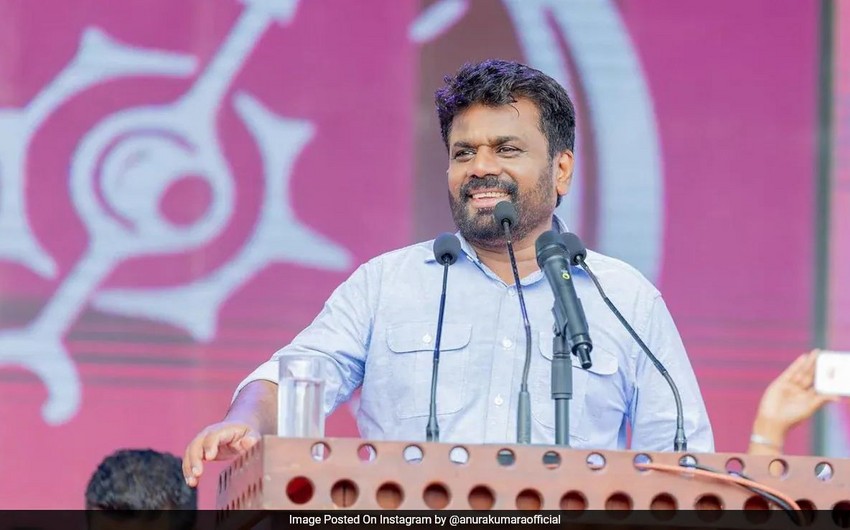Sri Lanka's new president, Anura Kumara Dissanayake, has taken his oath of office, promising to "rewrite history" for a country that is recovering from its worst economic crisis, Report informs referring to BBC.
The left-leaning Dissanayake has cast himself as a disruptor of the political status quo, and analysts see his victory as a rejection of corruption and cronyism that has long plagued the country.
Saturday's election was the first since 2022, when discontent over the economy fuelled mass protests and chased former president Gotabaya Rajapaksa from power.
Dissanayake has received messages of congratulations from Indian Prime Minister Narendra Modi, Pakistani Prime Minister Shehbaz Sharif and the US State Department.
In a statement on the eve of his swearing-in as president, the 55-year-old, also known as AKD, said "this victory belongs to all of us" and that Sri Lanka was at a "fresh start".
"The millions of eyes filled with hope and expectation push us forward, and together, we stand ready to rewrite Sri Lankan history," he said.
During the campaign, Dissanayake promised voters good governance and tough anti-corruption measures.
He has promised to develop Sri Lanka's manufacturing, agriculture and IT sectors. He has also committed to continuing the deal struck with the International Monetary Fund (IMF) to bail Sri Lanka out of the economic crisis while reducing the impact of its austerity measures on the country’s poorest.
Sri Lankan Prime Minister Dinesh Gunawardena resigned before Dissanayake was sworn in, paving the way for the dissolution of parliament.
In an earlier interview with BBC Sinhala, Dissanayake signaled that he would dissolve parliament soon after being elected.
"There is no point continuing with a parliament that is not in line with what the people want," he said at the time.
Dissanayake won after the counting stretched into a second round on Sunday, as no candidate was able to win more than 50% of the total votes in the first round.
Once the second and third-choice votes for president had been tallied, the Election Commission said Dissanayake had won with a total of 5,740,179 votes.
Opposition leader Sajith Premadasa came in second at 4,530,902. Outgoing President Ranil Wickremesinghe got 2,299,767 during the first round of counting and was excluded from the second round.
Wickremesinghe congratulated his successor, saying: "With much love and respect for this beloved nation, I hand over its future to the new president".
Until this weekend's vote, all of Sri Lanka's eight presidential elections since 1982 had seen the winner emerge during the first round of counting. This poll has been described as one of the closest in the country's history.
Dissanayake's anti-corruption platform resonated strongly with voters who have been clamoring for systematic change since the crisis.
This enabled him to overcome trepidation over the violent past of his political party, the Marxist Janatha Vimukthi Peramuna (JVP), which carried out two armed insurrections against the Sri Lankan state in the 1970s and 80s.
Dissanayake's alliance, the National People’s Power – of which the JVP is a part – rose to prominence during the 2022 protests, known as the Aragalaya – Sinhala for struggle.
Dissanayak has also sought to moderate the hard-left stance of his party in more recent years.


 https://static.report.az/photo/f9b3b417-c35a-379a-8254-3a697e905b1d.jpg
https://static.report.az/photo/f9b3b417-c35a-379a-8254-3a697e905b1d.jpg

